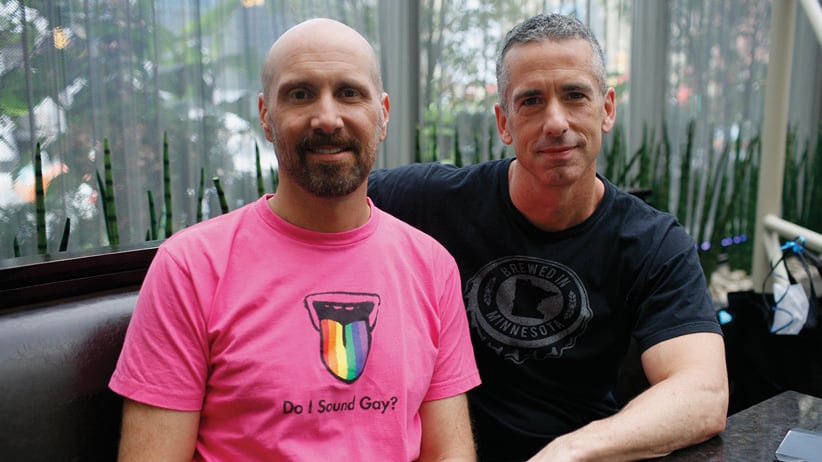Of lisps and linguistics: The power of the gay voice
A filmmaker examines the mysterious origin of the “gay voice”
Columnist Dan Savage and director David Thorpe of ‘Do I Sound Gay’ pose for a portrait during the 2014 Toronto International Film Festival on September 6, 2014 in Toronto, Ontario. Photograph by Jeff Harris
Share

When University of Toronto researchers Ron Smyth and Henry Rogers conducted a study on the so-called “gay voice” in the early 2000s, they came to an unsurprising conclusion. “We suspect,” they write in their paper, “Phonetics, Gender, and Sexual Orientation,” “that masculine features in female voices may have less of an effect on judgments of sexual orientations than feminine features in male voices.” Lesbians, in other words, are rarely identifiable by the way they sound. We may be, on occasion, a visible minority (our clothing, haircuts and fondness for unfortunate accessories sometimes give us away to coworkers and passersby on the street). But we are not, as many gay men tend to be, an audible minority.
When openly gay humour writer David Sedaris calls down to the front desk at a hotel, for example, he is often addressed as “ma’am,” by the concierge; a mischaracterization that delights him, but also fills him with deep shame. Sedaris expounds on this feeling in Do I Sound Gay?, an American documentary starring Brooklyn filmmaker David Thorpe that premiered this week at Doc NYC, and was featured at the Toronto International Film Festival in September. Thorpe, who directed the film and promoted it at TIFF with sex columnist Dan Savage (who also makes an appearance in the film), wanted to explore this shame and answer a question that has been on his mind his entire adult life: Why do so many gay men who are seemingly comfortable with their sexuality hate the way their voices sound? Thorpe never liked the sound of his own slightly effeminate voice, but it was the sound of other gay men’s voices that propelled him to make the film. “I was on a train ride to Fire Island [off Long Island] and I heard all these gay voices around me, and I was repelled,” he says. “I couldn’t believe that after 20 years of being out and fighting to create a gay community, I was repulsed by my own people, and by myself. My voice was the way that my internalized homophobia made itself known to me.”
In Do I Sound Gay?, Thorpe not only examines the mysterious, unresolved origin of the gay voice (characterized by a lisp and the elongation of certain syllables), but tries and fails, to rid himself of his own gayish inflection. He practises a variety of voice deepening, speech therapy exercises—employed frequently we learn, by closeted gay actors who want to butch up their voices for a straight audience.
What makes the film so compelling though, is that while Thorpe’s world is extraordinarily progressive, he has an incredibly hard time accepting his voice as is. Savage, whose sex advice column is syndicated internationally, says he sees this distaste for the stereotypical gay voice in progressive straight communities, too. Savage often gets mail from straight people who are happy to accept their newly out, gay male friends, but who are equally annoyed by how “campy” they sound. “I’ll get letters from straight men and women saying, ‘I love my gay friend but why does he have to act this way? He came out and suddenly he’s got this totally different voice. Why is he putting on this big gay act?’ ” What they don’t realize, says Savage, “is that the straight voice they were used to—that was the act.”
In linguistics, the practice of alternating between languages or, in this case, tones and inflections, is called code-switching, something Savage says he did at a very young age and still does occasionally when he’s “at a truck stop in middle America.” It’s easy to see how code-switching, in certain circumstances, might save a person’s life. But it’s also easy to see why a closeted gay kid might want to code-switch for other, more understated reasons, too. In popular culture, from James Bond to Aladdin, male villains sound unnervingly gay. This is true especially of popular children’s movies—a fact Thorpe touches on.
The gay voice does not merely belong to Mitch and Cam on Modern Family. It belongs to Scar in The Lion King, Jafar in Aladdin, Governor Ratcliffe in Pocahontas, and Severus Snape in Harry Potter (his loyalties may lie with Dumbledore, but he’s not exactly likeable). Even in FernGully, the formless goo-based villain, Hexxus, hisses his name in a tone you might hear on the set of Project Runway. Pixar is mostly an exception to this rule; many of the company’s villains exhibit a range of voices. But it is rare, even today, that a good, virtuous character has an explicitly gay-sounding voice in a kid’s movie.
In the end, the greatest irony about the arguably misogynistic aversion to the gay voice—as a sign of meekness and spinelessness—is how strong one has to be to actually use it.
“To leave the house as the incredibly swishy, fierce gay hairdresser takes a lot more courage than to leave the house as Jason Collins,” says Savage, referring to the NBA player who made history earlier this year when he came out of the closet. “I really like Jason Collins and respect him. But the world became safe for the gender-conforming basketball players to come out because the hairdressers couldn’t hide. And I think that is masculine as all f–king hell.”